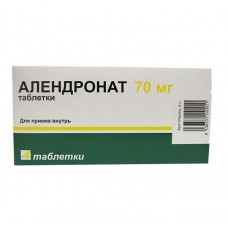Expiration date: 07/2026
Alendronate
The composition and form of issue
Tablets:
1 tablet contains Alendronate acid 10 mg or 70,
excipients: corn starch, lactose (milk sugar), magnesium stearate, MCC.
30 PCs (10 mg) and 4 pieces(70 mg) in a package.
Pharmacological action:
Alendronate - bone resorption inhibitor. Aminobisphosphonates, is an analog of pyrophosphate. The mechanism of action is associated with suppression of the activity of osteoclasts. Restores the positive balance between resorption and bone reconstruction, progressively increases bone mineral density (regulates calcium and phosphorus metabolism), promotes formation of bone tissue with normal histological structure.
Testimony
- osteoporosis in postmenopausal women (prevention of bone fractures, including hip and spine),
- osteoporosis in men
- osteoporosis caused by prolonged use of glucocorticosteroid drugs, Paget's disease.
Contraindications
- hypersensitivity to the drug component
- hypocalcemia,
- the failure of the patient is in the upright position (standing or sitting straight) for at least 30 minutes,
- severe renal insufficiency (creatinine clearance less than 35 ml/min),
- severe disorders of mineral metabolism,
- stricture or achalasia of the oesophagus and other conditions leading to difficulty of movement of food through the esophagus,
- severe hypoparathyroidism
- malabsorption of calcium,
- lactose intolerance, lactase deficiency, glucose-galactose malabsorption,
- pregnancy,
- lactation,
- the children's age.
With caution
Diseases of the gastrointestinal tract (GIT) in the phase of deterioration (dysphagia, esophagitis, gastritis, duodenitis, gastric ulcer and 12 duodenal ulcer), a deficiency of vitamin D.
Method of application and doses
Alendronate is used orally, 1 time per day with liquid on an empty stomach, preferably 2 hours (but not less than 30 minutes) before the first meal, water or other medicines. You should drink only plain water, because other drinks, including mineral water, coffee, tea, orange juice) reduce the absorption. The tablets should not be chewed or dissolve in the mouth.
The recommended dose is 1 tablet (10 mg) orally 1 time daily or 1 tablet (70 mg) orally 1 time a week.
For the treatment of osteoporosis in women (menopause) and in men, and osteoporosis caused by prolonged use of glucocorticosteroid drugs, Alendronate is taken for 10 mg/day. or 70 mg once a week.
Paget's disease is used in a dose of 40 mg/day for 6 months. In case of accidental dose was missed in mode one time per week you need to take one tablet in the morning, the nearest day. You should not take two tablets in one day, but in the subsequent need to continue to take one tablet the day of the week, which has been selected for admission from the beginning of treatment.
Side effects
From the side of gastrointestinal tract: dysphagia, esophagitis, abdominal pain, heartburn, dyspepsia, constipation, diarrhoea, flatulence. Rarely — nausea, vomiting, gastritis, melena, esophageal stricture, ulcers of the mucous membrane of the mouth and throat, ulcers of the esophagus, perforation of ulcer of esophagus with bleeding.
From the side of musculoskeletal system: pain in bones, muscles and joints. From the nervous system: headache. On the part of the organ of vision: uveitis, scleritis.
Allergic reactions: seldom — urticaria, angioedema, was reported isolated cases of emergence of a syndrome Stevens — Johnson and Lyell. Other: rash, itching, erythema, photodermatosis, symptomatic hypocalcemia. Described the development of osteonecrosis of the maxilla and mandible in General, patients with cancer following antineoplastic treatment, including bisphosphonates. Risk factors for the development of osteonecrosis are cancer, chemotherapy, radiation therapy, treatment with corticosteroids, inadequate oral hygiene, local infectious-inflammatory process, including osteomyelitis. In most of the cases described the patients to the treatment with bisphosphonates was produced by extraction of teeth.
Laboratory data: a slight and transient decrease in the concentration of calcium and phosphate.
Typical symptoms in early treatment — myalgia, malaise and rarely, fever.
Special instructions:
Absorption of bisphosphonates greatly reduced by a simultaneous intake of food.
To reduce the irritating effect on the esophagus Alendronate must be taken immediately as you Wake up with a full glass of water. After admission should be in an upright position (standing or sitting) for 30 minutes (dangerous to use the drug in case the patient's inability to stand or sit up straight for a specified time). Receiving Alendronate at bedtime or in a horizontal position increases the risk of developing esophagitis.
The patient should be informed about the need to stop taking Alendronate and consult a doctor with the development of dysphagia, pain when swallowing, pain behind the breastbone or in the event of heartburn.
While hypocalcemia it is necessary to conduct correction before treatment. It is also necessary to eliminate violations of mineral metabolism leading to hypocalcemia (vitamin D deficiency, hypoparathyroidism, malabsorption of calcium). Therapy should be provided in the background diet enriched with calcium salts.
When taking bisphosphonates (especially in concomitant therapy glucocorticosteroid drugs) is necessary to ensure delivery of adequate amounts of calcium and vitamin D from food or medicines.
In the treatment process due to the positive effects of Alendronate acid on the mineral density of bone tissue may be insignificant asymptomatic decrease in the concentration of calcium and phosphate in serum.
Before the appointment of therapy of bisphosphonates for patients with concomitant risk factors (e.g. cancer, chemotherapy, radiation therapy, ingestion of glucocorticosteroid drugs, lack of hygiene of the oral cavity) must undergo a dental examination with appropriate preventive dentistry. Patients undergoing treatment bisphosphonates should avoid invasive dental procedures. It was reported on osteonecrosis of the jaw generally associated with tooth extraction and/or local infection (including osteomyelitis) in cancer patients receiving intravenous bisphosphonates (many of them also were appointed chemotherapy and glucocorticosteroid drugs). There are reports on the development of osteonecrosis of the jaw in patients with osteoporosis on the background of the application best-Saratov inside.
In patients with osteonecrosis of the jaw and bisphosphonates therapy, dental surgical intervention may lead to worsening of the condition. If necessary, surgical interventions should be considered that the data on the possibility of reducing the risk of developing osteonecrosis of the jaw after the abolition of bisphosphonate do not exist.
Appointments and recommendations of the attending physician must be based on individual assessment of the benefit/risk for each patient.
Storage conditions
Keep out of reach of children at temperature not exceeding 25°C.
Shelf life — 2 years.


